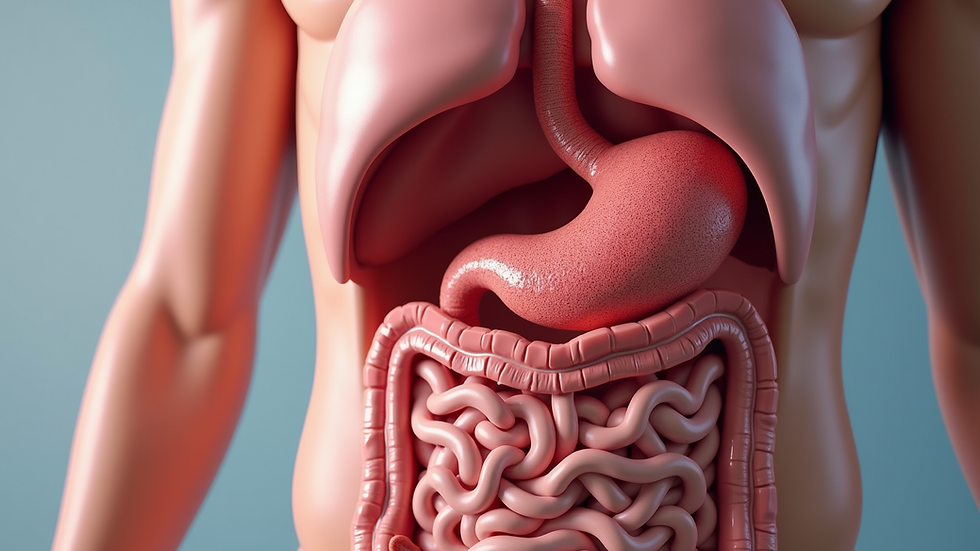Understanding the Role of the Pancreas in Digestion and Metabolism
- wideozero
- Sep 10, 2025
- 4 min read
The pancreas is an essential organ that plays a key role in both digestion and metabolism. Often overlooked, this gland is responsible for producing digestive enzymes and hormones that regulate blood sugar levels. Without a properly functioning pancreas, our bodies would struggle to process food and maintain stable energy levels. In this post, we will closely examine the structure of the pancreas, its critical functions, the diseases that may affect it, and actionable tips for maintaining its health.
Anatomy of the Pancreas
The pancreas is a long, flat gland situated behind the stomach, spanning approximately six to ten inches across the abdomen. It is divided into three main sections: the head, body, and tail.
The head of the pancreas fits snugly into the curve of the duodenum, the first segment of the small intestine. The body extends across the midline of the abdomen, while the tail tapers off toward the spleen.

The pancreas consists of both exocrine and endocrine tissues. The exocrine tissue produces important digestive enzymes, while the endocrine tissue produces hormones, including insulin and glucagon.
Functions of the Pancreas
Digestive Functions
The pancreas significantly impacts digestion by producing multiple enzymes that break down carbohydrates, proteins, and fats. Key enzymes include:
Amylase: Breaks down carbohydrates into simple sugars. Studies show that individuals with low amylase levels can have difficulty metabolizing carbohydrates, potentially leading to digestive problems.
Lipase: Supports the digestion of fats. It is essential for fat absorption by the intestines. A noteworthy statistic is that about 90% of dietary fat requires lipase for proper digestion.
Proteases: Break down proteins into amino acids essential for various bodily functions. Protease deficiencies can impair nutrient absorption.
These enzymes are released into the small intestine, where they work to digest food. Without these enzymes, the body struggles to absorb vital nutrients, which are fundamental for energy and overall health.
Endocrine Functions
In addition to digesting food, the pancreas regulates blood sugar levels through hormones, primarily insulin and glucagon:
Insulin: Lowers blood sugar levels by allowing glucose to enter cells. Approximately 1.5 million Americans are diagnosed with Type 1 diabetes, which indicates severe insulin deficiency.
Glucagon: Raises blood sugar levels by stimulating the liver to release stored glucose. In healthy individuals, the regulation between insulin and glucagon helps maintain blood sugar levels within a narrow range.
Maintaining a balance between these hormones is crucial. For example, a healthy range for blood sugar levels is generally between 70-100 mg/dL when fasting.
Diseases of the Pancreas
The pancreas can be impacted by several diseases that disrupt its functions. Some of the most prevalent conditions include:
Pancreatitis
Pancreatitis is inflammation of the pancreas, which can be either acute or chronic. Acute pancreatitis may result from gallstones or excessive alcohol consumption, leading to symptoms like severe abdominal pain. Chronic pancreatitis can develop from long-term alcohol abuse or genetic factors and may result in permanent pancreatic damage.
According to recent statistics, around 210,000 cases of acute pancreatitis are reported annually in the United States.
Diabetes Mellitus
Diabetes is a significant metabolic disorder characterized by high blood sugar levels due to inappropriate insulin production or usage. Type 1 diabetes occurs when the pancreas produces little to no insulin, while Type 2 diabetes, which affects nearly 90% of diabetes cases, often relates to insulin resistance. Managing these conditions is crucial to avoid complications like heart disease, kidney failure, or nerve damage.
Pancreatic Cancer
Pancreatic cancer is one of the most aggressive types of cancer and typically diagnosed at an advanced stage. Risk factors include smoking, obesity, and family history. Data indicates that the 5-year survival rate for pancreatic cancer is around 10%, often because it is detected late.
Supporting Pancreatic Health
Taking care of the pancreas is crucial for overall health. Here are some practical tips to maintain its function:
Eat a Balanced Diet
Consuming a diet rich in fresh fruits, vegetables, whole grains, and lean proteins supports pancreatic function. The American Heart Association recommends limiting saturated fats and sugars to less than 10% of your overall caloric intake.
Stay Hydrated
Drinking enough water aids digestion and supports pancreatic function. Staying hydrated can also prevent kidney stones, which can affect the pancreas. Aim for at least 8-10 cups of water daily, adjusting for activity level and climate.
Limit Alcohol Consumption
Excessive alcohol intake is linked to pancreatitis and various pancreatic disorders. Moderation is essential. A study found that consuming more than 2 drinks per day for men and 1 drink per day for women can significantly increase the risk of pancreatitis.
Regular Exercise
Engaging in physical activity can help maintain a healthy weight and regulate blood sugar levels. Research indicates that just 150 minutes of moderate exercise per week can lower the risk of developing Type 2 diabetes by 58%.
Regular Check-ups
Routine medical check-ups are important for monitoring pancreatic health, especially for individuals with risk factors for pancreatic diseases. Early detection is vital for effective management and treatment.
In Summary
The pancreas is a remarkable organ that plays a critical role in digestion and metabolism. By understanding its functions and the diseases that can impact it, we can take proactive steps to maintain our health. It is essential to adopt a healthy lifestyle and remain aware of any warning signs related to pancreatic health. Through these efforts, we can support our pancreas and improve our overall quality of life.




Comments